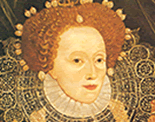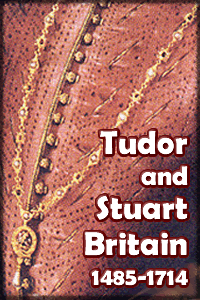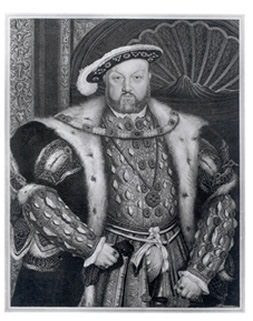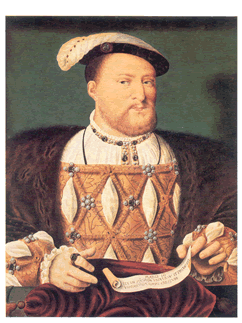|
|












|
|

|
|


Tudor's
Ground
Zero.
Popular Images
Do Not Reflect
The Real Henry VIII.
By Ronald Fritze
Posted on September 24, 2008, from Athens, Alabama
The plain truth is, that he [Henry VIII]
was a spot of blood and grease
upon the History of England.
Charles Dickens,
A Child's History of England
Henry VIII is one of the best known of all the kings of England. While he is not remembered as a great warrior or a prudent statesman, his massive girth still fills the imagination of popular history in the Anglo-American world. Denizens of Renaissance Faires are confronted with the imagine of the corpulent Henry as he wields his barbequed turkey leg like a war club.
The Henry VIII of popular culture is somewhat of an amiable buffoon. Lucky for us that the real Henry VIII is unaware of this canard on his image, otherwise he would have all of us locked up and eventually beheaded for the crime of lese majeste.
Occasionally Henry VIII appears as a villain. In the play and movie A Man for All Seasons, he tends to be shadowy in his evil, letting others do the dirty work.  Poor Henry VIII never appears as a hero in the products of popular culture, but at least in A Man for All Seasons he is being given his due. He was not a hero except in his own mind. Given Shakespeare's need to present positive images of the Tudors to his audiences, it is not surprising that his Richard III caught on while his Henry VIII is little remembered or performed. Circumstances did not allow Shakespeare to get very close to the real man when he told Henry VIII's story. For the sake of historical accuracy, however, that is probably just as well. Poor Henry VIII never appears as a hero in the products of popular culture, but at least in A Man for All Seasons he is being given his due. He was not a hero except in his own mind. Given Shakespeare's need to present positive images of the Tudors to his audiences, it is not surprising that his Richard III caught on while his Henry VIII is little remembered or performed. Circumstances did not allow Shakespeare to get very close to the real man when he told Henry VIII's story. For the sake of historical accuracy, however, that is probably just as well.
It is not surprising that the popular image of Henry VIII bears little resemblance to the real man. Henry VIII was an extremely complex individual. Historians have presented myriad interpretations of the enigmatic king, many of them contradictory. As a child, the future king grew up under reasonably normal circumstances for a royal. His parents had a loving marriage. They both treated him well and acted as good parents. But family tragedies did effect his childhood. His older brother Arthur died in 1502 when Henry VIII was around twelve and his mother Elizabeth of York died the next year in 1503. In the first instance, Henry VIII found himself thrust into the limelight as the new crown prince. In the next, he found himself without a mother.
His father Henry VII only had one son and heir left. Morbidly conscious of the fact that only one life stood between the Tudor dynasty and extinction, Henry VII carefully protected Prince Henry. Royal upbringings were frequently grim and stern. Some royal parents tried to avoid spoiling their heirs by strict discipline, which sometimes could be brutal and cruel. Such was not the case for Henry VIII. The crown prince was coddled and even spoiled. At a very impressionable age Henry VIII would have come to see himself treated as someone who was very special and unique. He was the future king. It is not surprising that he developed a very Henry-o-centric view of the universe — not surprising, but quite unfortunate for those around him.
Henry VIII expected to get his way. When he didn't, he became brooding, angry, and plotted revenge or punishment on those who thwarted him or disappointed him. Being close to Henry VIII was the most dangerous neighborhood to live in Tudor England — and the casualty rate was high.  Derek Wilson's book, In the Lion's Court: Power, Ambition, and Sudden Death in the Reign of Henry VIII (2001), is a study of the fortunes of six men with the Christian name of Thomas, who occupied prominent positions under Henry VIII: Thomas Wolsey, Thomas More, Thomas Cromwell, Thomas Howard, Thomas Wriothesley, and Thomas Cranmer. All achieved great success working for Henry VIII — and three of them died on the order of Henry VIII. A fourth had a narrow escape, while the other two survivors either suffered burning at the stake or suicide. These six men's lives were closely intertwined with that of Henry VIII. Their careers took place in the ground zero of the Tudor state, the king's court. Derek Wilson's book, In the Lion's Court: Power, Ambition, and Sudden Death in the Reign of Henry VIII (2001), is a study of the fortunes of six men with the Christian name of Thomas, who occupied prominent positions under Henry VIII: Thomas Wolsey, Thomas More, Thomas Cromwell, Thomas Howard, Thomas Wriothesley, and Thomas Cranmer. All achieved great success working for Henry VIII — and three of them died on the order of Henry VIII. A fourth had a narrow escape, while the other two survivors either suffered burning at the stake or suicide. These six men's lives were closely intertwined with that of Henry VIII. Their careers took place in the ground zero of the Tudor state, the king's court.
Fickle in his opinions, Henry VIII could bear grudges that never moderated. He was a typical Tudor in that he was highly intelligent, but his was an intelligence seldom used in a disciplined way to achieve positive purposes. Moralistic rather than moral, he could always find a way to justify his worst actions.
Henry VIII craved the glory and fame that came from fighting successful wars, but he lived in an age when England no longer possessed the resources to fight with any great success on the continent. His wars wasted England's wealth while other opportunities were lost. Although he was credited with the creation of the Church of England, it was not the king's theological commitments, but rather his marital problems that drove the Reformation forward in England. Religious division with great potential for violence was rife in England for decades after the reign of Henry VIII.
For all the turmoil, Henry VIII did not secure the succession of the Tudor dynasty in the long run. By 1603 the Tudors died out with his three children: Edward VI, Mary I, and Elizabeth I, a mere 55 years after Henry VIII's death. Summing up the reign of Henry VIII, the distinguished historian Sir Geoffrey Elton wrote:
His [Henry VIII's] achievement must strike the reflective mind as remarkable: a grave threat of invasion from France, an uncured canker of war in Scotland, the wasting away of the crown's recently enlarged resources, a country drained by the heaviest taxation for centuries (some of it dubiously legal), and a major economic crisis in what had been the least crisis prone of the economies of western Europe. That his achievements did not destroy the monarchy which his father, Wolsey, and Cromwell had fashioned, nor produce a real collapse and a class war in England, was none of his doing; for by mid-1546 Henry was no longer in a condition to devise or control policy."
— G. R. Elton, Reform and Reformation: England 1509-1558 (1977), p. 316

To read Dr. Fritze's previous Tudor-Stuart essay, Good to Be King? Give Henry VII His Proper Due as Tudor Founder, click the reading glasses above.

|
|